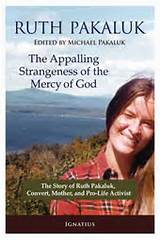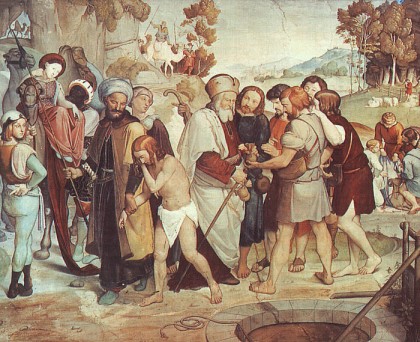The Trouble with Hagiography
Devra Torres | Sep 20, 2014 | 5 cmts
The Appalling Strangeness of the Mercy of God is a book that was on my meaning-to-read list for months. I’m only partway through the introduction, but already there's a lot to like.

The book is a collection of letters from Ruth Pakaluk, a woman I knew slightly when we lived in New England. In fact, we were sent to visit Ruth and her husband right after our marriage by a priest friend who thought it would be good for us to see everyday matrimony in action—a kind of belated marriage-prep field trip.

Ruth was an atheist girl who went to Harvard, converted to Christianity, got married (her husband Michael put the book together), bore seven children, and then died of cancer at the age of 41. It’s not far-fetched to think she might be canonized one day.
I’m not even up to the letters yet, but something in Mike’s introduction struck me. In putting together a collection like this, the first task is come up with criteria for including or excluding this or that letter, or passage. He explains:

A final goal of mine was to avoid any kind of falsifying idealization. A collection of letters, which were not originally written for any set purpose and certainly were never intended for publication, can hardly err in that direction. … letters might seem to err in another way, by exposing seeming shortcomings or faults, from which someone might mistakenly conclude—from the mere fact that these letters are published and therefore seemingly offered as a model—that faults which were such as those would not be faults, or that a reader might, in his own case, safely acquiesce to them. But of course this collection must be read with good judgment, just like anything else.
A reasonable request, but. as anyone who’s used the internet for five minutes knows, one that can’t be taken for granted.
Michael continues:
And to attempt to remove anything that could be potentially be misleading would turn this collection of letters into “spiritual lessons” and “spiritual reading,” as Newman remarks, which is not their purpose. They are not in the first instance to edify but to display and reveal.

“To display and reveal”: in other words, to let the truth speak for itself. If it’s the truth about a particular woman, you let her speak for herself. You don’t skip to “the moral of the story” without telling the story. Otherwise, you might end up like those who disbelieve in biblical miracles but lack the common sense to conclude that the whole thing is baloney. They persist in pretending that you can retain the “inspirational” part but skip the truth part. They imagine that dishonoring the truth can be edifying.
Michael calls Bl. Cardinal Newman to witness:

Along similar lines, Newman warns sharply against what he calls “the endemic perennial fidget which possesses us about giving scandal”: “facts are omitted” and “glosses are put upon memorable acts, because they are thought not edifying, whereas of all scandals such omission, such glosses, are the greatest.”
St. Josemaria Escriva, Michael points out, expresses the same idea:
I have never liked biographies of saints which naively—but also with a lack of sound doctrine—present their deeds as if they had been confirmed in grace from birth. No. The true life stories of Christian heroes resemble our own experience: they fought and won; they fought and lost. And then, repentant, they returned to the fray.

Another recent article speaks to this confusion of falsifying with edifying: it turns out St. Therese of Lisieux's autobiography was edited to the point of censorship. In Censoring St. Thérèse: 5 Things You Didn’t Know about the Little Flower, Joe Sparks writes about the concern for scandal that produced some very incomplete editions of the book.

Are there any holy books that don’t indulge in edifying falsification? There is one: the Word of God. It’s been pointed out that one powerful piece of evidence for the truth of the Old Testament, especially, is that it avoids precisely this kind of innocuous niceness: if you were making up an “inspiring” legend of your people, stories of Cain and Abel, Joseph and his brothers,

and David and Bathsheba would likely be excluded. It’s much more plausible that the human authors of Scripture were calling it the way they saw it. And for those who believe that God is the divine Author, the guarantor that all the human ones wrote what He wanted written, it seems that God Himself doesn’t approve of sacrificing truth for niceness. (This also explains why it’s so full of good stories.)
Once you set yourself up as judge of what’s edifying and what’s not, you’re liable to fall into the most arrogant act of all: disregarding the truth because you know better. This is not a well-intended foible; this is straight from the playbook of the Father of Lies.
That’s just the introduction. I fully expect to encounter much more good stuff, edifying or not, as I make my way through the letters.


Comments (5)
Jules van Schaijik
Sep 20, 2014 1:57pm
Amen! And well said. I couldn't agree more Devra.
Gary Gibson
Sep 25, 2014 5:47am
Devra - this is very profound and edifying. C. S. Lewis wrote about this (even though he was not Catholic - he died "!0 years too soon" someone once remarked before talking his way into the Church). We must not airbrush over the faults of our heroes. That's wny I loved the book "Saints Behaving Badly". Jesus told French mystic Gabrielle Bossis "A Saint is not a saint all the time". We are all "in process". Some of us get farther than others. Some are canonized as martyrs for the faith, even though their life was far from virtuous. There are a lot of ways to "steal Heaven". Grace makes it possible.
Gary
Katie van Schaijik
Sep 25, 2014 12:14pm
Thanks to this post, I bought the book and read it. We know the family a little, our daughters having lived with them while they were away at school. It's a lovely memorial of a life well-spent.
One of things that struck me most was how very different the time she lived in was from the present, even though it wasn't so long ago. For instance, the priest abuse scandals hadn't yet broken, and heterodoxy seemed a more serious threat in the Church.
Not only are saints not perfect, their particula mode of sanctification has very much to do with the time and circumstances in which they live.
Devra Torres
Sep 25, 2014 4:26pm
Jules, thank you! Gary, yes, I've been rethinking how I explain these things to my children, even the very young ones: rather than speaking as if "bad people" go to hell and "good people" to heaven, I emphasize living as a friend of Jesus and staying close to Him, and always remembering that even if you do something very, very bad, you can always, always, say you're sorry and start over. And if you don't feel sorry or you feel worried about your ability to start over, you can always ask for help. On the other hand, I don't encourage living your life badly and imagining you'll be able to pull off a deathbed conversion at the last minute, without the help of good habits and without being used to thinking of God as a person you can come to and ask for help from.
Devra Torres
Sep 25, 2014 4:30pm
Katie, yes, the same thing struck me, though I haven't finished the book yet. Reagan, Solidarity, the Equal Rights Amendment--it all seems so long ago, but it really wasn't.